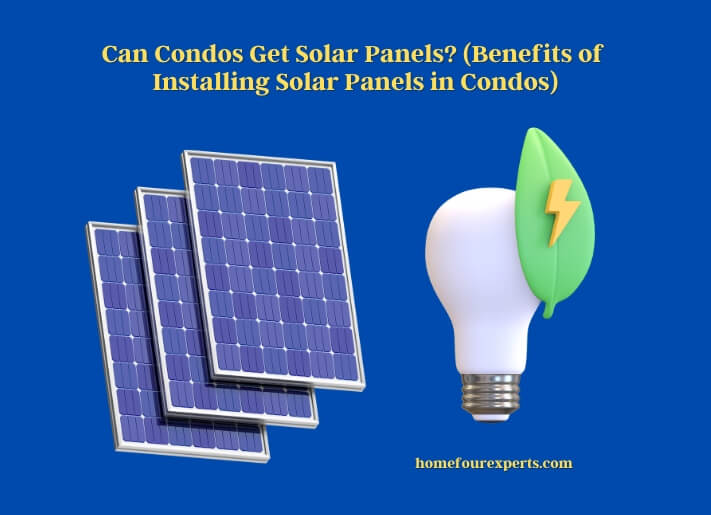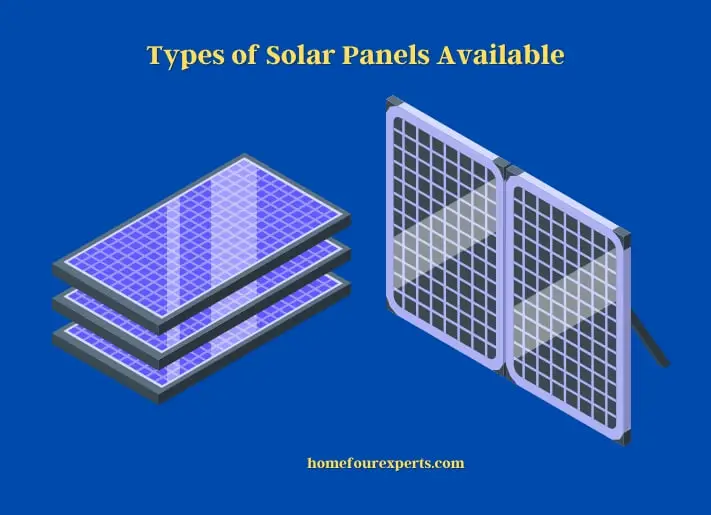Published on: April 9, 2023
Written by Eric Devin / Fact-checked by David Rowan
As the world continues to grapple with the impact of climate change, more and more people are looking for ways to reduce their carbon footprint and make a positive impact on the environment. One popular solution is the installation of solar panels, which harness the power of the sun to generate clean energy.

From understanding condominium ownership to evaluating a building’s suitability for solar panels, we’ll take a detailed look at what it takes to make solar power a reality for condo dwellers. We’ll also examine the benefits and drawbacks of solar panel installations, as well as the financing options available to those looking to make the switch to solar. It’s essential to consider all aspects of solar panel installation, including the weight of the panels.
Understanding Condominium Ownership
Before delving into the question of whether or not condos can get solar panels, it’s important to first understand the unique nature of condominium ownership. Unlike single-family homes, where the owner has complete control over the property, condominiums are owned collectively by all of the unit owners within a building or complex. This means that any changes or modifications to the building must be approved by the condominium corporation, which is made up of representatives from each unit.
In the case of solar panel installations, this means that all unit owners within the building must agree to the installation and bear the costs associated with it. Because solar panels are typically installed on the roof of a building, ownership of the roof must also be considered. In some cases, the roof may be considered common property and therefore any changes made to it must be approved by the condominium corporation.
It’s also worth noting that some condominium corporations may have specific bylaws or regulations regarding solar panels, which could impact the feasibility of installation. For example, a condominium corporation may require that all solar panel installations be done by a specific contractor or meet certain aesthetic standards. Before pursuing a solar panel installation, it’s important to thoroughly review the condominium corporation’s bylaws and regulations to ensure that the installation is allowed and meets all necessary requirements.
Condo Association Rules and Regulations
Condo associations often have specific rules and regulations that govern what can and cannot be done within a building or complex. These rules may impact the feasibility of installing solar panels, as they may place restrictions on the size, location, or appearance of solar panel installations.
For example, some condominium associations may have restrictions on the size of solar panel installations, limiting the amount of space that can be used for solar panels. Others may require that solar panels be installed in a specific location or at a specific angle in order to maintain a consistent appearance across the building.
Some condominium associations may require that all solar panel installations be done by a specific contractor or meet certain aesthetic standards. This can impact the cost of installation, as well as the feasibility of finding a contractor who meets the association’s requirements.
It’s important to thoroughly review the condo association’s rules and regulations before pursuing a solar panel installation, as failure to comply with these rules can result in fines or other penalties. It may also be helpful to work with a solar panel installation company that has experience working with condo associations and can help navigate any specific requirements or restrictions.
Evaluating the Building’s Suitability for Solar Panels
When considering solar panels for a condominium building, it’s important to evaluate the building’s suitability for installation. This involves assessing a number of factors, including the orientation and slope of the roof, the amount of available sunlight, and the condition of the roof.
One of the most important factors to consider is the orientation and slope of the roof. In order to maximize energy production, solar panels should be installed on a roof that faces south or southwest and has a slope of between 15 and 40 degrees. The roof should be free of obstructions such as trees or nearby buildings that could cast shade on the solar panels and reduce their efficiency.
The amount of available sunlight is also an important consideration, as solar panels require direct sunlight in order to generate electricity. A building that is surrounded by tall buildings or located in a shaded area may not receive enough sunlight to make solar panels a viable option.
The condition of the roof must be evaluated to ensure that it can support the weight of the solar panels and that there are no leaks or other issues that could impact the installation. A professional evaluation of the roof’s condition is recommended before proceeding with a solar panel installation.
Evaluating the building’s suitability for solar panels is an important step in determining whether or not solar panels are a viable option for a condominium building. Working with a professional solar panel installation company can help ensure that all of these factors are carefully considered and that the installation is done properly and safely.
Types of Solar Panels Available
There are several types of solar panels available for use in a condominium building. The most common types include:

- Monocrystalline solar panels: These are made from single-crystal silicon and are known for their high efficiency and longevity. They are typically more expensive than other types of solar panels.
- Polycrystalline solar panels: These are made from multiple silicon crystals and are slightly less efficient than monocrystalline panels. They are typically more affordable and offer a good balance of efficiency and cost.
- Thin-film solar panels: These are made from a thin layer of photovoltaic material that is applied to a backing material such as glass or metal. They are less efficient than crystalline panels, but are more flexible and lightweight, making them a good option for certain types of installations.
- Building-integrated solar panels: These are designed to blend in with the building’s exterior and can be incorporated into roofing materials or installed as facade elements. They offer a seamless, aesthetically pleasing option for solar panel installations.
Financing Options for Solar Panels
Installing solar panels in a condominium building can be a significant investment, but there are several financing options available to make the process more affordable.
Cash Purchase
This involves paying for the solar panel installation upfront with cash or a personal loan. While this option may require a large upfront investment, it can ultimately result in significant long-term savings on electricity costs.
Solar Loans
Many banks and credit unions offer specialized loans for solar panel installations, with competitive interest rates and flexible repayment terms. These loans may be secured or unsecured, and may require a down payment.
Power Purchase Agreements (PPAs)
A PPA is a financing agreement between a solar panel installation company and a condominium building, in which the installation company owns and operates the solar panels and sells the electricity generated to the building at a fixed rate. This option requires no upfront investment from the building, but may result in higher long-term costs.
Solar Leases
Similar to PPAs, solar leases involve a financing agreement in which the installation company owns and operates the solar panels and the building pays a fixed monthly lease payment for the use of the panels. This option requires no upfront investment, but may result in higher long-term costs.
Government Incentives
Many governments offer incentives and tax credits for solar panel installations, which can significantly reduce the overall cost of the installation. These incentives may vary by location and may require specific criteria to be met.
Benefits of Installing Solar Panels in Condos
There are several benefits to installing solar panels in condominium buildings.
- Reduced electricity costs: Solar panels generate electricity from the sun, which can significantly reduce the building’s reliance on grid electricity and lower electricity costs over time.
- Increased property value: Installing solar panels can increase the overall value of the condominium building, as more and more homebuyers are prioritizing energy-efficient and sustainable features in their home search.
- Environmental sustainability: Solar panels produce clean, renewable energy and reduce the building’s carbon footprint, contributing to a more sustainable and eco-friendly living environment.
- Energy independence: By generating their own electricity, condominium buildings with solar panels can become more independent from the electricity grid and more resilient to power outages and disruptions.
- Improved building performance: Solar panels can help regulate the temperature of the building, reducing the need for air conditioning and improving overall building performance.
- Positive community impact: Installing solar panels in a condominium building can inspire other buildings in the community to do the same, creating a positive impact on the community as a whole.
Potential Drawbacks of Installing Solar Panels in Condos
While there are many benefits to installing solar panels in condominium buildings, there are also some potential drawbacks to consider. Installing solar panels can require a significant upfront investment, which may not be feasible for all condominium buildings or homeowners.
Some jurisdictions may have specific regulations and zoning restrictions related to solar panel installations, which can create challenges for the installation process.
The effectiveness of solar panels depends on the orientation of the building and the amount of shading it receives. If a building is not well-suited for solar panel installation, it may not generate as much energy as expected.
Solar panels require regular maintenance to ensure optimal performance, and may need repairs in the event of damage or malfunction. This can result in additional costs and maintenance responsibilities for the condominium building and its residents.
Some residents may have concerns or objections about the installation of solar panels, either due to aesthetic concerns or disagreements about the costs and benefits of the installation.
If you want to know about how to building a home security system? Read the article for details.
Final Words
Solar panels are a viable option for condo buildings looking to reduce their energy bills, carbon footprint, and increase their property value. While there may be some challenges and limitations to installing solar panels on condos, such as limited roof space and complex ownership structures, it’s important to note that with the right planning and implementation, these obstacles can be overcome.
With the increasing demand for renewable energy and eco-friendly buildings, installing solar panels on condos is becoming a more popular choice among condo owners, developers, and management companies. In addition to the financial and environmental benefits, it can also improve the overall image and appeal of a condo building, making it more attractive to potential buyers and renters.
Condos can definitely get solar panels and reap the benefits they offer. It’s important to work with experienced professionals and do thorough research to ensure the project is feasible, cost-effective, and meets all regulatory requirements. With proper planning and implementation, solar panels can be a game-changer for condos, helping to reduce their carbon footprint, save money, and increase their overall value.
About This Writer

Hi, I am Eric Devin and I am a professional interior architect. Since childhood, I've always enjoyed DIY projects! And, I have loved to solve simple household problems using essential tools and equipment. I have also acquired a lot of information about basic household tools settings by working with contractors.